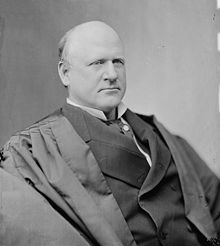John M. Harlan
| John Marshall Harlan | |
|---|---|
 |
|
| Associate Justice of the Supreme Court of the United States | |
|
In office November 29, 1877 – October 14, 1911 |
|
| Nominated by | Rutherford Hayes |
| Preceded by | David Davis |
| Succeeded by | Mahlon Pitney |
| Attorney General of Kentucky | |
|
In office September 1, 1863 – September 3, 1867 |
|
| Governor | Thomas Bramlette |
| Preceded by | Andrew James |
| Succeeded by | John Rodman |
| Personal details | |
| Born |
June 1, 1833 Boyle County, Kentucky, U.S. |
| Died | October 14, 1911 (aged 78) Washington, D.C., U.S. |
| Political party |
Whig (before 1854) Know Nothing (1854–1858) Opposition (1858–1860) Constitutional Union (1860–1864) National Union (1864–1865) Democratic (1865–1868) Republican (1868–1911) |
| Spouse(s) | Mallie Shanklin (1868–1911) |
| Children | 6 |
| Education |
Centre College (BA) Transylvania University |
| Religion | Presbyterianism |
| Signature | |
John Marshall Harlan (June 1, 1833 – October 14, 1911) was an American lawyer and politician from Kentucky who served as an associate justice on the U.S. Supreme Court.
Harlan was born at Harlan's Station, 5 miles (8.0 km) west of Danville, Kentucky on Salt River Road, in 1833 to a prominent family. He attended school in Frankfort and then graduated from Centre College. Harlan entered Kentucky politics in 1851, and served a variety of positions, most notably Attorney General of Kentucky, from 1863 to 1867. When the American Civil War broke out, Harlan strongly supported the Union, although he opposed the Emancipation Proclamation and supported slavery. However, after the election of Ulysses S. Grant as President in 1868, he reversed his views and became a strong supporter of civil rights. In 1877, Harlan was appointed a member of the Supreme Court.
A Christian fundamentalist, Harlan's Christian beliefs strongly shaped his views during his tenure as Supreme Court justice. He is best known for his role as the lone dissenter in the Civil Rights Cases (1883), and Plessy v. Ferguson (1896), which, respectively, struck down as unconstitutional federal anti-discrimination legislation and upheld southern segregation statutes. These dissents, among others, led to his nickname of "The Great Dissenter". Harlan died in 1911, at the age of 78.
...
Wikipedia
